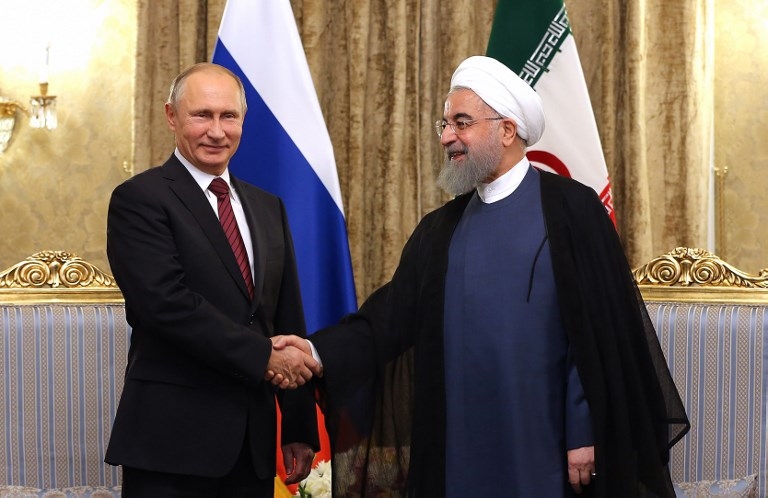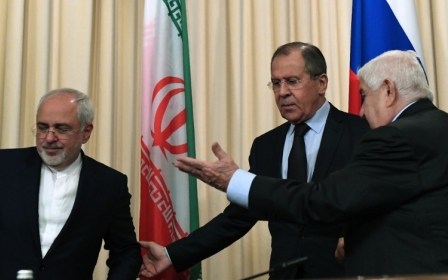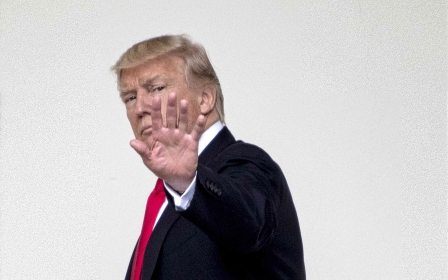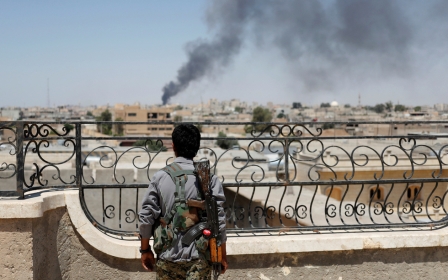Khamenei says Iran, Russia should cooperate to isolate US

Iranian Supreme Leader Ayatollah Ali Khamenei told visiting Russian President Vladimir Putin on Wednesday that Tehran and Moscow must step up cooperation to isolate the United States and help stabilise the Middle East, state TV reported.
"Our cooperation can isolate America ... The failure of U.S.-backed terrorists in Syria cannot be denied but Americans continue their plots," Khamenei told Putin, according to Iranian state television.
Putin met Iranian political leaders in an effort to nurture a warming relationship strengthened since US President Donald Trump threatened recently to abandon the international nuclear deal with Iran reached in 2015.
The Kremlin strongman will also take part in a three-way summit with Iranian President Hassan Rouhani and the leader of ex-Soviet Azerbaijan Ilham Aliyev aimed at bolstering economic ties between their energy-rich nations.
Since Russia's military intervention in Syria's war in 2015, and with stepped-up Iranian military assistance, Assad has taken back large amounts of territory from rebels as well as swathes of central and eastern Syria from Islamic State militants.
Moscow is now trying to build on that success with a new diplomatic initiative, including a congress of Syria's rival parties it plans in the Black Sea resort of Sochi on Nov. 18, though a major opposition bloc has refused to take part.
Rouhani echoed Khamenei, saying Iran and Russia together could tackle "regional terrorism" - an allusion to Sunni Muslim armed groups hostile to Iran, Assad and many other Arab states.
"Our cooperation has helped the fight against terrorism in the region ... Together we can establish regional peace and security," Rouhani said in a televised joint press conference with Putin and Azerbaijan President Ilham Aliyev, who took part in a three-way summit in Tehran.
Our cooperation has helped the fight against terrorism in the region ... Together we can establish regional peace and security
- Hassan Rouhani, Iranian president
Russia and Iran, key military supporters of President Bashar al-Assad, and Turkey, which backs Syrian rebels, have organised a series of peace talks in the Kazakh capital Astana this year, agreeing on the establishment of "de-escalation" zones in various parts of the war-torn country.
Tehran signed the deal with six countries including Russia and the United States, but Trump last month refused to certify the agreement, drawing criticism from Moscow which slammed the US president's "aggressive and threatening rhetoric" against Iran.
Syrian political settlement?
Ahead of Putin's arrival, Iran's official IRNA news agency reported Russia's chief of staff Valery Gerasimov flew into Tehran for talks with his Iranian counterpart Mohammad Bagheri to discuss "Syria...and the fight against terrorism."
The military might of Moscow and Tehran in Syria has helped prop up Assad's forces and turn the protracted conflict in his favour with a string of key battlefield victories.
Since the start of the year Russia has looked to cement the gains from its game-changing intervention by spearheading the peace push at talks in Kazakhstan, positioning itself as a broker between key players Iran and Turkey and largely bypassing the West.
The zones were initially credited for bringing about a significant reduction in bloodshed, but international aid groups say they are currently failing to curb the fighting.
Now Moscow seems keen on expanding its peace drive in search of a political settlement and on Thursday got Iran and Turkey to agree an initiative for a "Congress of Syrian National Dialogue" that aims to bring together some 33 delegations in the Russian city of Sochi on 18 November.
Nuclear developments
Putin and the Iranian leadership are also set to find common cause in their fierce opposition to Trump's sPuttance on the 2015 deal to curb Iran's nuclear ambitions.
The US leader's decision not to certify the deal has been opposed by the other international powers that signed off on it as they insist the agreement is working.
The lifting of the sanctions under the nuclear deal has opened Iran up for business and Russian firms are competing to bolster their involvement in the country.
Moscow and Tehran have had close military and economic relations for some time, and in the nuclear field Russia has already built one reactor at Iran's Bushehr plant and just started work on two new ones.
Putin's arrival in Iran comes a day after the US Treasury added 40 Iranian individuals and entities already targeted by sanctions to a counter-terrorism blacklist.
Despite initial opposition, Trump in August signed off on a sanctions bill targeting Russia, Iran and North Korea after it was passed overwhelmingly by Congress.
New MEE newsletter: Jerusalem Dispatch
Sign up to get the latest insights and analysis on Israel-Palestine, alongside Turkey Unpacked and other MEE newsletters
Middle East Eye delivers independent and unrivalled coverage and analysis of the Middle East, North Africa and beyond. To learn more about republishing this content and the associated fees, please fill out this form. More about MEE can be found here.




